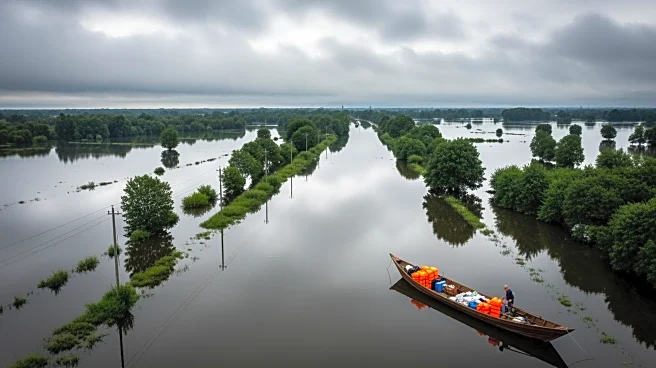What's Happening?
Vietnam is currently facing severe flooding and landslides, resulting in at least 90 fatalities and 12 individuals reported missing. The floods have caused extensive damage to 186,000 homes and swept away
over three million livestock. The provinces of Quang Ngai, Gia Lai, Dak Lak, Khanh Hoa, and Lam Dong have been identified as the most severely affected areas. The Vietnamese government has mobilized military and police resources to assist in these regions. The floods follow the impact of typhoons Kalmaegi and Bualoi, which struck the country in quick succession. Rainfall levels have reached unprecedented heights, with some areas experiencing levels not seen since 1993. Scientists attribute the increased frequency and intensity of such extreme weather events to human-driven climate change.
Why It's Important?
The floods in Vietnam highlight the growing vulnerability of regions to extreme weather events, exacerbated by climate change. The significant loss of life and property underscores the urgent need for effective disaster management and climate adaptation strategies. The mobilization of military and police resources reflects the severity of the situation and the government's commitment to addressing the immediate needs of affected communities. The economic impact is substantial, with hundreds of millions of pounds worth of damage reported, affecting both local livelihoods and the broader economy. This event serves as a stark reminder of the global challenges posed by climate change, emphasizing the need for international cooperation and sustainable practices.
What's Next?
As the rainfall is expected to ease in the coming days, recovery efforts will likely intensify. The Vietnamese government may focus on rebuilding infrastructure and providing support to displaced families. International aid and support could be sought to assist in recovery and rebuilding efforts. Long-term strategies may include enhancing flood defenses and implementing climate adaptation measures to mitigate future risks. The government may also engage in discussions with international partners to address climate change impacts and seek collaborative solutions.
Beyond the Headlines
The floods in Vietnam raise important questions about the ethical responsibilities of nations in addressing climate change. The disproportionate impact on vulnerable communities highlights the need for equitable climate policies that prioritize those most at risk. The event may also prompt discussions on the legal obligations of countries to reduce emissions and support affected regions. Culturally, the floods could lead to shifts in community practices and resilience strategies, as local populations adapt to changing environmental conditions.










